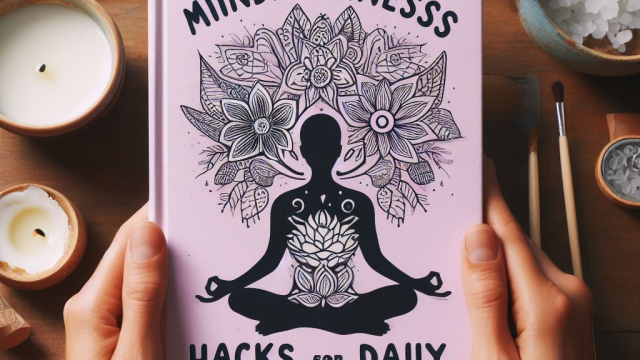
Practicing mindfulness has become an increasingly popular way to reduce stress, increase focus, and achieve balance in our busy modern lives. Research continues to reveal the incredible benefits of mindfulness for both mental and physical well-being.
Incorporating mindfulness techniques into your daily routine can lead to positive changes in your health, relationships, work performance, and more. Read on to discover 10 amazing ways mindfulness can transform your life.
What is Mindfulness?
Mindfulness is the practice of bringing your full attention to the present moment. It involves focusing your awareness on the sensations, thoughts, and feelings occurring right now, without interpretation or judgment.
Mindfulness originated from ancient Buddhist teachings and has since been adopted into mainstream wellness practices. Due to its numerous advantages, doctors, therapists, and health experts now recommend it.
Some common mindfulness practices include:
- Mindful breathing
- Body scans
- Meditation
- Yoga
- Mindful eating
Cultivating mindfulness is the act of purposefully paying attention, non-judgmentally, to whatever you experience in the present moment.
Benefits of Mindfulness for Overall Wellbeing
Research continues to demonstrate how mindfulness positively impacts both mental and physical health in numerous ways.
1. Reduces Stress
Mindfulness helps activate the body’s relaxation response. Staying focused on the present counteracts worries about the past or future, major sources of stress. Mindfulness also helps you recognize stressors and manage them more effectively.
Studies show mindfulness practices reduce levels of the stress hormone cortisol. Lower stress leads to less anxiety, depression, and fear.
2. Improves Sleep Quality
Mindfulness techniques have been found effective in treating insomnia and improving sleep quality. Paying attention to your breath and body sensations helps quiet your mind before bed. This allows you to fall asleep faster and get deeper, more restorative sleep.
3. Boosts Immune System
Stress weakens your immune system and increases your susceptibility to illnesses like the flu or the common cold. The stress-reducing effects of mindfulness help boost immune function. One study found mindfulness meditation increased antibody responses after a flu vaccine.
4. Enhances Focus and Concentration
Mindfulness teaches you to direct your attention purposefully instead of being distracted by worries, multitasking, or external stimuli. Improved focus enhances work performance, learning abilities, and concentration for any task.
5. Helps Manage Chronic Pain
Mindfulness-based stress reduction (MBSR) programs have been found effective in easing various types of chronic pain. Staying focused on the present can shift your experience of pain and reduce perceived intensity.
6. Decreases Depression
Being mindful interrupts the endless loop of negative thoughts that feed into depression. Mindfulness-based cognitive therapy (MBCT) significantly reduces the chances of depression relapse. It teaches patients to recognize and halt the spiral of depressive rumination.
7. Improves Cardiovascular Health
Mindfulness can lower blood pressure and cholesterol levels, reducing your risk of heart disease. It also helps manage feelings of anxiety or panic that often coincide with heart disorders. Overall stress reduction enhances cardiovascular health long-term.
8. Slows Aging
Studies link mindfulness practices like meditation, yoga, and tai chi to increased telomerase activity. Telomerase helps protect telomeres, the protein caps at the ends of our chromosomes. This may help slow cellular aging.
Mindfulness Benefits for Mental Health
In addition to physical benefits, mindfulness is incredibly helpful for promoting mental health in the following ways:
9. Increases Self-Awareness
Mindfulness helps you tune into subtle signals from your body and mind that you might otherwise miss. Noticing fleeting thoughts, physical sensations, and emotional nuances builds stronger self-awareness over time.
10. Reduces Anxiety
Focusing on the present can short-circuit worry and fear cycles that fuel anxiety. Mindfulness also lessens emotional reactivity. Being less reactive creates more space to make thoughtful decisions instead of knee-jerk reactions.
11. Decreases Stress-Related Cravings
Common cravings often stem from stress or emotional turmoil. Mindfulness helps identify your cravings without reacting to them. This self-awareness empowers you to make intentional choices around foods, substances, or behaviors.
12. Builds Emotional Resilience
Viewing experiences from a mindful, non-judgmental perspective increases emotional resilience. Accepting thoughts and feelings at the moment without believing that they define you leads to greater calm and balance.
13. Enhances Self-Compassion
Mindfulness helps quiet your inner critic. Recognizing painful thoughts or emotions with kindness builds self-compassion. You gain the courage to be imperfect as a profound act of self-care.
14. Improves Relationships
The ability to stay present and attuned to others deepens intimacy in relationships. Mindfulness also boosts empathy, listening skills, and emotional intelligence—key components of healthy relationships.
Key Takeaways on Mindfulness Benefits
- Mindfulness is the practice of purposefully focusing your attention on the present moment.
- It originated from ancient Buddhist teachings and is now a mainstream wellness practice.
- Mindfulness reduces harmful stress and boosts immunity, sleep, focus, and chronic pain relief.
- It decreases the risk of depression, anxiety, burnout, and emotional reactivity.
- Mindfulness slows aging, builds self-awareness, and enhances relationships.
- Regular mindfulness practice leads to positive changes in both mental and physical well-being.
- Meditation, mindful breathing, yoga, body scans, and mindful eating are easy ways to cultivate mindfulness daily.
- Committing to a mindfulness practice can lead to a total mind-body transformation.
Frequently Asked Questions About Mindfulness
How do I get started with a mindfulness practice?
Start small – even 5 minutes per day of mindful breathing, meditation, or yoga can make a difference. Download apps like Calm, Headspace, or Insight Timer, which offer guided meditations. Take a mindfulness class to learn techniques from an expert.
When is the best time of day to practice mindfulness?
It’s ideal to meditate or do yoga first thing in the morning to center yourself and set intentions for the day. But any time you can find even a few minutes to practice is beneficial—try during lunch breaks or before bed.
Where is the best place to practice mindfulness?
Find a quiet space with minimal distractions. Turn off your devices and sit comfortably. You can meditate anywhere—outside in nature, at your desk, on the bus or train, or in a quiet room at home
What should I be paying attention to during mindfulness?
Tune into your breath, bodily sensations, emotions, or sounds around you—whatever you notice in that moment. If your mind wanders, gently return your focus to the present.
How can I make mindfulness a habit?
Start small—5 or 10 minutes per day. Set a reminder to practice at the same time every day. Find forms of mindfulness you enjoy, like walking, dancing, crafting, or yoga. Apps can help track progress and keep you motivated.
What should I do if mindfulness feels uncomfortable?
It’s normal to feel some discomfort sitting still or having awareness of difficult emotions. Notice these feelings with compassion. Adjust your practice as needed—try a shorter time, walking meditation, or yoga for a different experience.
How long does it take to experience the benefits of mindfulness?
Many people notice some positive effects, like lower stress, after just a few sessions. But cultivating mindfulness takes practice; its benefits continue to unfold gradually over weeks, months, and years.
Is mindfulness beneficial for kids and teens?
Yes, mindfulness can help kids and teens manage stress, anxiety, anger, focus issues, and peer pressure. Tailor practices and keep sessions brief—3 to 5 minutes max for young kids. Schools are implementing mindfulness programs successfully.
Can mindfulness help with severe anxiety or depression?
In many cases, it can be part of an overall treatment plan. Always consult a doctor or mental health professional for serious conditions. Mindfulness should complement medical treatment and therapy.
Adopting a regular mindfulness practice can lead to incredible transformations in your physical health, mental well-being, focus, relationships, and more. By fully embracing the present moment, you can create positive change and unlock your greatest potential. Give mindfulness a try; your future self will thank you!



